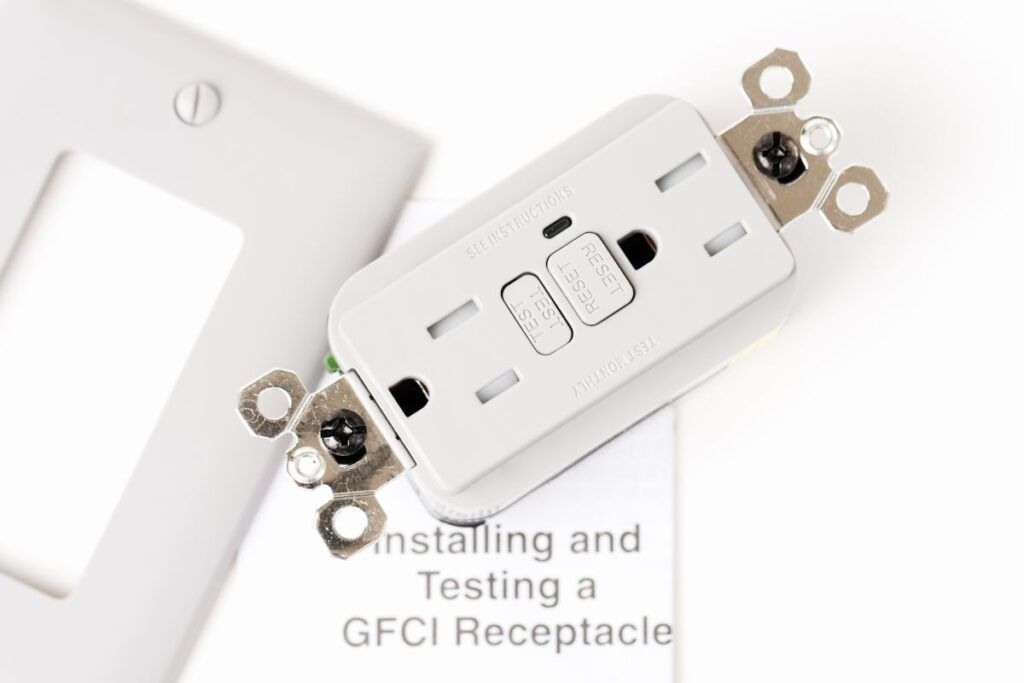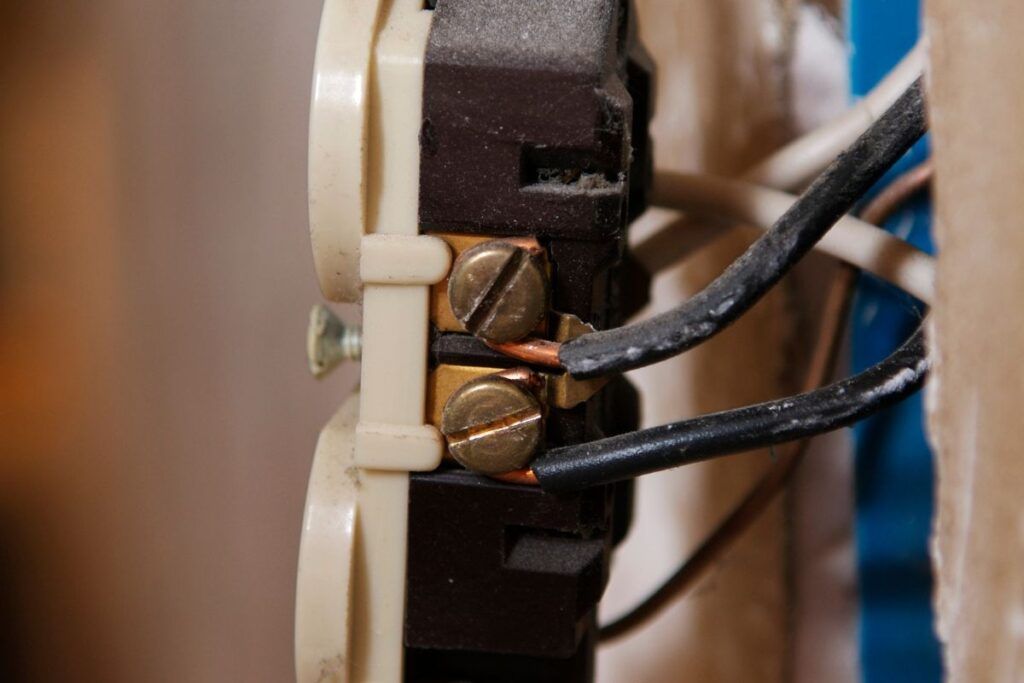GFCI outlets have become common in most houses. Installing GFCI outlets is an excellent way to prevent electrocution and fire hazards. However, they will still face certain problems, like humming, buzzing, popping, or cracking noises.
A GFCI outlet will make noises due to loose connections, a defective GFCI outlet, dimmer switches, old wirings, breaker issues, or temperature changes. Once you notice the sound, you can either reset the outlet or plug the appliance elsewhere until you fix the issue.
However, the GFCI makes a slight humming noise while resetting, but a continuous noise indicates a problem. This guide will take you through the reasons and basic troubleshooting methods. However, you must always consult an expert.

Check out our list of top-handpicked products for all your electrical, appliance, and HVAC system needs to keep your home running smoothly.
This post includes some affiliate links.What is a GFCI outlet?
The term GFCI stands for Ground Fault Circuit Interrupter.
It has test and reset buttons.
GFCI trips off whenever it detects overloading or upcoming fire hazards, saving you from electrical accidents.
The circuit breaks down whenever there is an imbalance in the incoming and outgoing currents.
The circuit also senses the ground fault and disrupts the current flow.
These devices are usually used in some regions of the house where the current consumption is higher, like bathrooms, kitchens, or laundry rooms.
Why does the GFCI outlet make noise?
Usually, whenever you try to reset a GFCI outlet, it makes a slight buzzing sound which disappears after some time.
But if your GFCI outlet is making a constant noise that remains for a long time, it strongly implies that something is wrong with the outlet and needs to be replaced.
Though you can troubleshoot some problems yourself, it is better to consult an expert to correct them.
Below are some common reasons behind a GFCI outlet making several types of noises.
Faulty GFCI outlet
One common reason behind a noisy outlet is a faulty outlet.
A defective GFCI outlet may hum loudly, chirp, or buzz due to the declining elements inside the outlet.
The contact blades inside the outlet hold the plugs in place.
If these blades get damaged or loose, they cannot support contact with the plugs.
As a result, it causes buzzing.
In such cases, call an electrician to fix the problem.
You will have to replace the whole GFCI outlet and install a new one.
The GFCI outlets are not expensive and can be purchased from local stores or from Amazon.
I really this the quality of this Leviton GFCI outlet which I bought from Amazon.
Hire a professional so the outlet gets installed correctly and the connections can make enough contact.
Also read: Why Does My GFCI Outlet Have No Power?
Loose connections

The next reason GFCI outlets make noises is the wires’ loose connections.
Whatever the reason, the wires inside the outlet will become loose and vibrate.
This vibration will create a buzzing, chirping, or crackling sound in the outlet.
Crackling sounds can sometimes indicate a dangerous internal arcing in the outlet.
The wires capped and twisted inside the outlet with the wires connected to the outlet will also start vibrating due to the loose connections.
Loose connections are mostly seen in the old outlets.
But, it can also happen due to improper installation of the outlet.
The outlets with the connections were not secured or tightened well by the professionals.
The electrician must tighten these connections properly to prevent noise.
You can do this yourself too.
Make sure you turn off the breaker before you start working with it.
However, if you do not find any loose connections, there might be other reasons.
Appliance sound
Sometimes, it is not the outlet that causes the sound.
The GFCI outlet will make a noise whenever you plug any appliance into the socket.
You will hear a crackling, hissing, or buzzing noise from the outlet.
The reason could be a faulty plug with loose connections and damaged wires.
Understanding whether the culprit is the appliance or the outlet can be difficult.
Defective light fixture
It is the same as the ‘appliance sound’ point.
You might have a light fixture with poor wire connections for which you will hear such weird noises.
In such cases, the noise comes from inside the fixture connected to the outlet but not the outlet.
To confirm the defect, consider shifting the fixture to some other outlet.
If it still makes the same noise, the problem is with the fixture, not the GFCI outlet.
Dimmer switches
If dimmer switches share a circuit with other outlets, you will hear noises from the light fixture and the outlet.
To find out if the dimmer switch is making the noise, shut off the dimmer switch and listen for the sound.
Try swapping the light bulb with a rough service bulb to fix it.
If the solution doesn’t work, replace the dimmer switch with a regular one.
Temperature changes
GFCI outlets will also make noises if drastic temperature changes occur.
The temperature changes can cause the electrical equipment to expand and contract.
This expansion and contraction further loosens the connection inside the outlet and results in weird noises, like a crackling sound from the outlet.
Bad wiring
The wires can be due to poor installation, corroded or burnt wires, or they are getting old over time.
You will hear a buzzing and popping sound indicating bad wiring in the outlet.
Bad wiring can cause arcing or other serious issues in your outlet.
Over time, you may hear a crackling sound due to arcing.
If this is the reason, hire a professional to fix the problem soon.
Please do not attempt to do anything yourself if the problem is in the wirings.
Breaker issues

Your breaker is distributing too much or too little electricity to the outlets. It makes a buzzing noise.
Unlike the other issues, you cannot fix the breaker problems in your outlet.
Here also, you must call a professional to fix the circuit.
In most cases, you might have to replace the circuit to prevent the weird noises in your GFCI outlet from further happening.
What are the different kinds of noises you hear from GFCI outlets?
The GFCI outlets make different noises at different times, like:
- Humming
- Buzzing
- Hissing
- Clicking
- Crackling
- High-pitched
- Chirping
- Popping
The reasons are more or less the same as discussed previously.
But, at different stages, the outlet will make different noises.
Let’s discuss some common noises in brief.
Humming GFCI
A humming sound from the GFCI outlet is the result of electrical transmission.
But, if the humming transfers to buzzing, the outlet has some problems.
A loud humming sound indicates a faulty GFCI outlet. But a little humming is not a matter of concern.
Chirping GFCI
Chirping happens due to loose connections in the outlets, overloading, or faulty outlets or receptacles.
It is uncommon to hear a chirping sound from the GFCI outlet.
When it does, people get very tense and surprised.
Chirping is also heard in the transmission lines due to the corona discharge.
So, it is quite uncommon to hear such sounds.
However, some GFCI devices make chirping noises when they trip off.
GFCI outlets with such sounds are made for visually impaired customers who cannot see and detect the tripping of the breaker.
Crackling sound
Loose connections and drastic temperature changes cause arcing and crackling sounds from the GFCI outlets.
Crackling sound can be quite risky as it happens due to internal arcing in the outlet.
You must fix it soon with the help of a professional.
Loud noise in GFCI
A loud noise in the GFCI outlet is a sign of danger.
A GFCI chirping and clicking with noises while tripping and resetting is not very dangerous.
However, do not expect to hear such noises if the instructor denies such noises during tripping or resetting.
In that case, your outlet is faulty.
Consult a professional if you notice something like burning smells, flickering lights, or heated outlets.
The sound can occur due to loose connections, old, worn-out wires responsible for arcing, damaged or defective GFCI outlets, or defective appliances.
High-pitched GFCI outlet
High-pitched noise in the GFCI outlet is common when it trips.
But it is not normal at other times, especially if you can hear them.
Consult with your known technician or outlet instructor about the noise.
If they deny the occurrence of such noises, the reason could be loose connections or faulty outlets, which you should fix soon.
Popping GFCI outlet
Popping sounds can be dangerous, especially if a burning smell accompanies them.
The popping sound is similar to the cracking sound.
Some people name them differently because there is a slight difference.
When this happens, consult an electrician immediately to find out what is wrong with your outlet.
Mostly it can be due to faulty devices and not the outlet.
Why does the GFCI breaker make noise?
A GFCI breaker will make noise due to vibrations in the outlets due to loose connections, spikes and surges, defective appliances and outlets, and old or damaged wires.
A breaker humming or clicking is not a very big problem.
Sometimes, a ground fault can cause a clicking sound.
But, if the noise is loud and stays for a long time, it is time to hire a professional.
Loud GFCI noises are not good for the breaker or the outlet.
You will hear a small noise due to the electricity flow, but it should not be loud.
Is the GFCI outlet making noise dangerous?
It is stressful to hear noises like buzzing, crackling, popping, hissing, etc., for the first time from the GFCI outlets.
Not all the noises are dangerous.
Some GFCI noises, especially those which remain for a short time or have very low volumes, do not indicate any immediate danger.
Slight humming or clicking is okay.
However, you must check the outlet, circuit, or appliance.
If you cannot understand, call a professional as a precautionary measure.
If the noises are loud and stay for a long time, there is some flaw in the outlet, like loose connections, overloading, etc.
How can you fix a GFCI outlet making noise?

In most cases, the professionals conduct the corrections behind a noisy GFCI outlet.
They can understand the exact problem much better and can solve the issue quickly and correctly.
However, you can also do it if the problems are minor and don’t require much experience.
The level and type of noise in your outlet will determine whether you can troubleshoot the issue or if you need an expert.
Replacing bad and old wires, outlets, defective outlets, and appliances is done easily when a professional deals with it.
Some people get excited about replacing the outlets.
Your outlets will only require replacement if the noises are weird and loud.
Otherwise, a slight noise is normal.
Sometimes the GFCI will chirp or hum when it trips off.
It is normal, and you do not have anything to do here.
Final thoughts
In some circumstances, GFCI outlets making slight noises are fine as it is their natural feature. It does not signify any immediate threats. This noise comes from the current flow and outlet tripping due to overloading.
But, if the noise is too loud, there are problems, like loose wires, damaged outlets, defective outlets or appliances, temperature changes, dimmer switches, etc.
You must call a professional to deal with it. Sometimes, the problem is in the light fixtures, and the appliance plugged in. So, find the real cause before treating the outlet.
FAQs
What does it mean if your lights have buzzing noises?
It is normal and will occur even if you use incandescent or LED bulbs.
Electrical shorts or unsecured fixtures can make a buzzing noise in your lights.
The common cause could be an imbalance in the light’s voltage.
Will buzzing cause fire hazards?
When GFCI outlets make noises, you should find out the cause and fix it with the help of an expert.
But, if you let it remain like that for a very long time, it might result in fire hazards one day.
You will see lights flickering, fuses blowing, or outlets warming after a short time.
These can cause a fire in your house.
Reference: Residual-current device, Electrical circuit.


